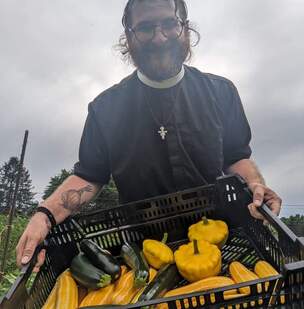|
by Rev. Jimmy Pickett  Oftentimes when I think of the beginning of Jesus’ public ministry, I tend to think about John’s account. John tells us of a Jesus who is trying to not make a big scene, but Mamma Mary knows what her kid is capable of and sort of gently pushes Jesus into performing the first miracle of turning water into wine at the Wedding of Cana. But that’s not what we hear today. Mark, always seemingly running out of time, immediately shows us Jesus the exorcist, the joy of preachers everywhere during this lectionary year… Upon first reading, this story from today’s Gospel seems like a scene out of a horror movie with a yelling priest and a kid with a spinning head. Thanks Hollywood. But upon second reading, as I sat at my friend’s kitchen table earlier this week, sharing my frustration about interpreting this text, we both came to a bit of a deeper understanding of what might have been going on here. Centuries of translation, tradition, pop culture, and less than helpful misunderstandings of mental and emotional health have been piled onto Mark’s telling of this healing miracle in Capernaum. Oftentimes the term “unclean spirit” is understood to mean a demon which makes it easy to jump to the idea of demonic possession, but when we strip away the layers of added baggage and let the original text speak for itself, we can come to a deeper understanding of what Jesus is doing for this man. As we were sitting around the table, there was one word that my friend noticed in the original Greek text that stood out, and the only reason I became aware of it is because I spoke the demon of my frustration out loud. In the light of day, that frustration dwindled away and gratitude and curiosity took its place. That one word in verse 26 translated as “unclean” is written ακάθαρτος (akathartos). This discovery got me curious about the opposite. What is the word for to clean, or purify, or to purge away? Καθαρίζω (katharizo), or in modern English, catharsis. Moments of catharsis are so important for our emotional, mental, and spiritual well being, they allow us to clear out whatever is blocking us from moving forward. In Mark’s account of this healing in Capernaum, we aren’t told anything else about the person Jesus meets, only that they cried out in a moment of catharsis. When Scripture leaves this vague emptiness of detail, Ignatious of Loyola invites us to read our lives into the text. Here we are invited to remember a good cathartic cry with a friend, or to drop our pain at the center of a labyrinth, or throw our anger into the frozen river by breaking the ice with a rock. We are also invited to think about where it is in our lives that we need Jesus to remove whatever is hindering us from living healthy and holy lives with ourselves, our neighbors, and God. What do you need to cry out? Shame? Anger? Fear? We live in a day and age of division and we will only be able to heal that division with God’s help and some catharsis. Our relationships with each other and with ourselves depend on us naming our suffering, then God can help in the transformational work of healing in our own hearts, in our community and our society. There are so many ways this healing can come about. St. Francis went out in the streets and swapped clothes with a homeless man and ate the same food he and his friends had begged for, so fear of people living on the streets lost its power over him. Some people go to the gym and punch a punching bag until their anger dissipates. One time I was watching Grey’s Anatomy and just sobbed on the kitchen floor for a good 15 minutes because I couldn't hold my grief anymore. And I felt a new kind of freedom after those tears ran out of me. Jesus said “I came that they might have life and have it more abundantly”, and here in today’s Gospel we see this gift of abundant life given. Abundant life does not mean simple, easy, anxiety free, walks through the rose garden every day (though those are nice). Abundant life means the real, authentic, angry hot tears that Jesus knows all too well. Thanks be to God for the Incarnation because our God knows intimately what it means to need a moment of catharsis in order to keep moving forward, and is telling each one of us that we will be picked up when we fall apart. It’s part of what it means to be human, to be fully alive, not just fine or ok, but real. You’re not alone in whatever you’re holding, God has given us the gift of community and the invitation to catharsis, God has given us each other that we might have abundant life. Amen. Comments are closed.
|
We are blessed to have a diversity of preaching voices in our parish. Our guild of preachers is a mixture of lay and clergy. We hope you enjoy the varied voices. Meet our Preachers
All
Archives
July 2024
|